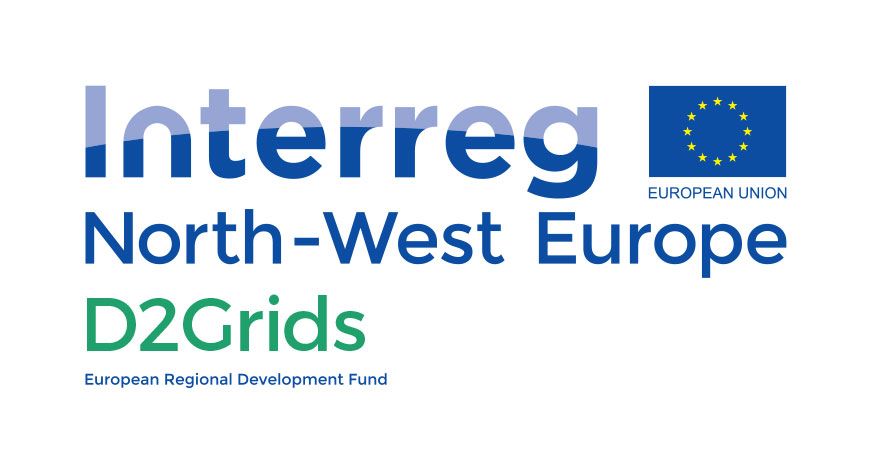
D2GRIDS PROJECT
Rolling out 5th generation heating and cooling across Europe
The 5th generation district heat and cold grid (5GDHC) was first developed in Heerlen, Netherlands, by Mijnwater Energy Ltd. In contrast to traditional district heating, it is an intelligent thermal network based on a local low-temperature loop. Decentralised energy production, using heat pumps located at the user's premises, allows energy exchange on the network, where flows are demand-driven. This concept allows the recovery of cold and heat emitted by supermarkets, data centers, factories, offices etc.
D2GRIDS stands for "demand-driven grids". It is an Interreg Northwest Europe (NWE) project that runs for more than 4 years (2018-2023). Mijnwater Ltd, based in the Netherlands, is coordinating the project with 16 other main partners and 6 secondary partners. Five pilot sites located in Paris-Saclay (France), Bochum (Germany), Brunssum (Netherlands), Glasgow and Nottingham (UK) will develop 5GDHC networks.
Project objectives
The D2GRIDS project aims to develop 5th generation urban heating and cooling networks (5G DHC) in Europe. They will allow to anticipate the needs or sources of fatal heat, cold or renewable electricity in their vicinity. Similarly, local collective self-consumption logic will be optimized by broadly integrating heating and cooling needs, storage capacities or associated thermal or electrical flexibility.
The objective is to maximize the share of renewable energies in these local energy loops, through an industrialization of the approach, a standardized technological model, and a clarification of the business model to strengthen the interest of these projects for third party investors. The project involves the implementation of 5 demonstrators in Paris-Saclay (FR), Bochum (GE), Brunssum (NL), Glasgow and Nottingham (UK). D2Grids will also prepare similar developments in Parkstad Limburg, North-East France, Flanders, the Ruhr region, Scotland and the East Midlands (United Kingdom). Dedicated education and training programmes will be set up by Open University, a partner in the project, providing expertise in post-graduate and digital learning.
Project extension
As a result of the 2nd capitalisation call, in addition to the main project work on the heating and cooling dimensions of these closed energy grids, the D2Grids consortium will now also work on better integration of electrical uses and local renewable electricity production capacities, to improve the decarbonisation of 5GDHC networks. GreenFlex will be the leader of this new “Capitalisation Work Package”, which is composed of 7 partners from the initial consortium (Mijnwater B.V, Asper Investment Management, Clyde Gateway, Open University, Construction21, VITO and GreenFlex) and 4 new partners (Engie Services Netherlands, Scottish Water Horizons, LLC & Associates Lawyers and the French Social Housing Company Seqens).
Role of Construction21
As a communication partner in this project, Construction21 will implement a multi-channel communication strategy (newsletter, social networks, online communities, videos). While disseminating the project's news, Construction 21 will also provide general information on urban heating and cooling networks, thus creating a community of interest around the project. Raising awareness and increasing the knowledge of professionals about this new technology will thus contribute to its adoption. The pilot site visits will present the results of the project and begin the commercialization phase.
Expected results
Several results are expected, including:
- Strategic and feasibility studies to support and deploy the approach;
- Training programmes for professionals and potential project owners;
- The construction of a transnational community of experts via an exchange platform. This will allow feedback from projects and consolidate a catalogue of best available technologies;
- An analysis of the potential approach potential of "Smart Contracting", particularly based on blockchain. It will thus serve to create greater trust between actors. It will also facilitate the implementation of local energy exchange marketplaces on these energy loops.
This 24 million EUR project is supported by INTERREG North-West Europe funds, covering close to 60% of the fundings (14.4 million EUR).
Project partners
1 lead partner:

16 main partners:

6 subpartners :


To go further :
Join the community on Construction21




